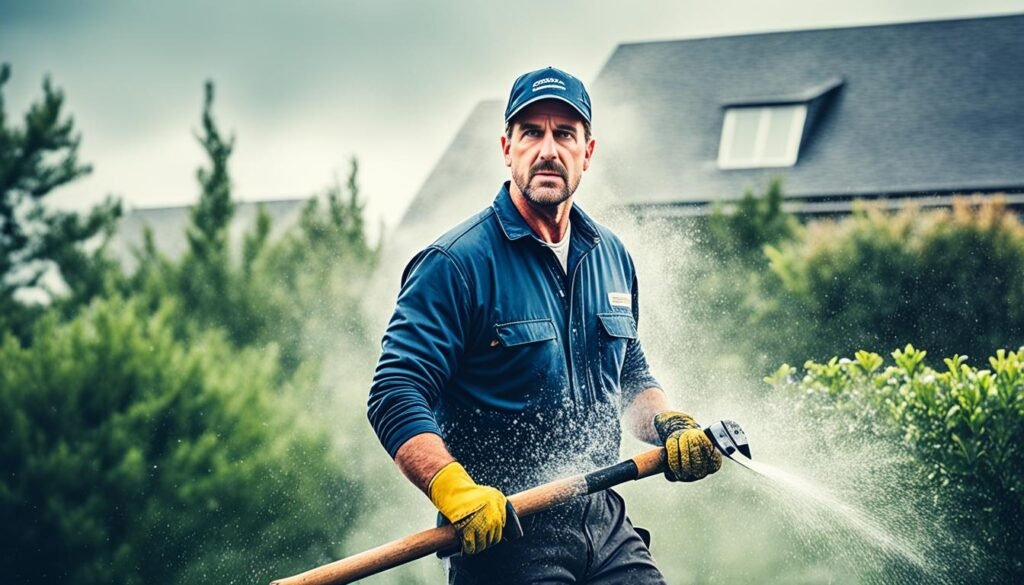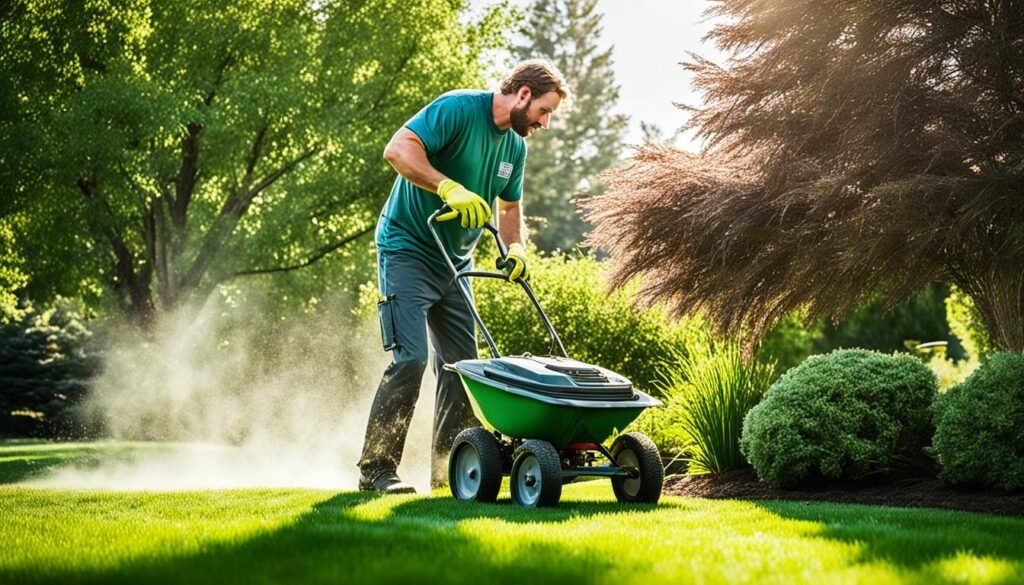About 57% of those who work in the U.S. and Canada feel stress each day. This shows how tough jobs in fields like landscaping can be. Landscaping is hard work, with its tough physical demands, changing seasons, and need for quick, high-quality results. It’s no wonder many in the industry face stress and mental health issues.
Workers in landscaping brave the elements and loud noises daily. They also deal with not enough workers and problems getting supplies. These issues can really affect their health. It’s important to know about these challenges. This way, we can figure out how to best help those who take care of the great outdoors.
Key Takeaways
- Landscaping is a physically demanding job that can lead to high levels of stress and burnout among workers.
- Exposure to extreme temperatures, noise, and other environmental factors are common sources of stress for landscaping professionals.
- Seasonal demand fluctuations, labor shortages, and supply chain issues add to the industry’s unique challenges.
- Implementing heat-management policies, providing mental health resources, and using efficient landscaping software can help mitigate stress.
- Understanding the specific stressors faced by landscaping workers is crucial for supporting their overall well-being and job satisfaction.
Understanding the Challenges of Landscaping Careers
Physical Demands and Heat Stress
Landscaping is tough work. It includes tasks like mowing, trimming, and planting in the sun. Workers also lift heavy gear. The hot weather can be exhausting, and it’s easy to get sick from the heat or feel very tired. All this can lead to workers feeling high levels of stress.
Workers in landscaping face many dangers. They might get cuts, risk getting hit by electricity, or hurt their bodies due to how they work. They also face extreme temperatures, have to lift heavy items, use vehicles often, and work with many harmful chemicals. There’s also a risk of slipping or falling. Some have even died from accidents, like a person being crushed between machines or falling out of a truck.
Getting electrocuted is another serious risk. It can happen, for example, when a tree falls on a power line. Sadly, some have lost their lives this way. One arborist in Massachusetts passed away after touching a high-voltage line. There’s also the story of a landscape worker who died of heat stroke while on the job.
To help their teams, landscaping firms should look out for their physical and mental health. They can do this by making sure workers take enough water breaks and setting up work schedules that reduce heat exposure. By focusing on these issues, employers can provide a safer, more supportive work environment for their teams.

“The hazards of lifting and awkward postures in landscaping work are addressed through training guides and resources focusing on back injury prevention and proper lifting techniques.”
Dealing with pesticides is yet another major worry. Companies must take steps to avoid their workers getting hurt by these chemicals. There’s also a lot of information out there to help prevent common accidents like falling. It reminds workers to use ladders correctly and to be careful when working high up in trees.
Stress in Landscaping Careers
Landscaping pros deal with physical stress and other challenges that can affect both their mental health and job happiness. This includes working against tight deadlines, trying to meet client needs, and facing limited chances for career growth. Such obstacles can cause burnout and upset the balance between work and life.
Another big stress for those in landscaping is managing employees who aren’t performing well. This can be tough, especially with staff who have been around a long time. On top of this, issues in how things are done can stress out workers further. Changing processes can be seen as a big deal, making it hard to improve.
Maintaining a work-life balance is key but tough for many in landscaping. The job often leaves little time for personal life or time with family. To reduce stress, it can help to delegate tasks or hire others to do some work. Achieving a good balance takes effort.
Building relationships with peers and staying positive are also crucial stress-busters in this field. Connecting with others, finding mentors, and celebrating successes can make a career in landscaping more rewarding and less stressful.
Supporting the mental health of those working in landscaping matters a lot. With good communication, access to help, and a supportive work atmosphere, employees can better cope with job challenges. This focus on wellness results in a stronger, happier team and better business performance.
| Stress Factor | Percentage Affected |
|---|---|
| Interview Anxiety | 40% |
| Lack of Feedback Post-Application and Post-Interview | 30% |
| Job Opportunity Search | 20% |
| CV Crafting | 10% |

Dealing with different stressors and having good ways to cope is vital for those in landscaping. It helps them stay mentally well and happier with their work. Taking a full approach to stress reduction is key for this industry’s lasting success.
Conclusion
Working in landscaping can be tough, but companies can do a lot to help their employees. They can make rules about working in the heat, care about how their workers feel, and create a friendly work setting. This can improve how workers feel, keep them healthy, and help them enjoy their job more.
To have a great career in landscaping, it’s crucial to deal with stress well. This means having good ways to handle the heat, offering help for mental health, and making sure employees can balance work and life. By taking care of their team’s health, landscaping businesses can help their employees really succeed in a field that can be both challenging and fulfilling.
The landscaping world has lots of hard parts, such as tough physical work and dealing with things like the COVID-19 pandemic. But, if companies work hard to face these tough issues and support their staff, they can make the job better. By looking after the whole person and focusing on what outdoor workers need, the landscaping field can beat its difficulties and stay strong with a happy, healthy team.
FAQ
Is landscaping a high-stress job?
A: Yes, landscaping can be very stressful. The work is physically demanding and changes with seasons. This creates a lot of stress for those in the field.
Workers deal with long hours, hard physical work, and weather extremes. They also have tight project deadlines. This mix can take a toll on both their bodies and minds.
What are the physical demands of a landscaping career?
A: Landscaping jobs require a lot of physical effort. Workers do tasks like cutting grass and moving heavy tools. They work in warm, humid weather. This can cause health problems like heat stroke and tiredness.
Exposure to high temperatures and the intensity of the work can lead to heat-related illnesses. This includes dehydration and fatigue. All these factors add up to stress at work.
What other stressors do landscaping professionals face?
A: Landscapers have more to tackle than just physical work. They must meet project deadlines and please clients. Also, advancing their careers can be hard. These challenges can lead to burnout, less satisfaction with their jobs, and a tough work-life balance.
Source Links
- https://ope-plus.com/2022/11/21/handling-stress-in-the-landscaping-industry/19934/
- https://www.onetonline.org/link/summary/37-3011.00
- https://www.youraspire.com/blog/why-landscaping-businesses-fail
- https://www.osha.gov/landscaping/hazards
- https://blog.landscapeprofessionals.org/managing-stress-as-a-lawn-care-or-landscape-business-owner
- https://www.forbes.com/sites/benjaminlaker/2024/02/01/the-secondment-experience-a-pathway-to-growth-or-a-career-stalemate/
- https://blog.landscapeprofessionals.org/managing-stress-as-a-lawn-care-or-landscape-business-owner/
- https://www.linkedin.com/pulse/unveiling-stress-landscape-job-hunting-castle-employment-agency-mqkte
- https://money.usnews.com/careers/articles/low-stress-jobs
- https://landscapearchitecturemagazine.org/2022/04/19/work-in-progress/
- https://greenplantsforgreenbuildings.org/wp-content/uploads/2021/01/1.-Workplace_greenery_and_perceived_level_of_stress.pdf
- https://www.ncbi.nlm.nih.gov/pmc/articles/PMC8767951/




